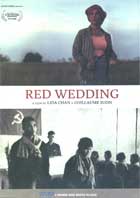
Red Wedding 2012
Distributed by Women Make Movies, 115 W. 29th Street, Suite 1200,New York, NY, 10001; 212-925-0606
Produced by Rithy Panh
Directed by Lida Chan and Guillaume Suon
DVD, color, 58 min.
Sr. High - General Adult
Asia, Cambodia, Crimes Against Humanity, Khmer Rouge
Date Entered: 09/09/2014
Reviewed by Cliff Glaviano, formerly with Bowling Green State University Libraries, Bowling Green, OHUnder the Khmer Rouge regime (1975-1979) an estimated 250,000 young women were forced into marriage with Khmer Rouge soldiers in hopes of raising the Cambodian population from 8 million to 20 million by 2000. In these forced marriages, many of which can best be described as legal, arranged rape, the “brides” were spied on, and those who didn’t conform to their “husband’s” wishes, were executed or sent for reeducation. Cambodian women who were subject to these forced marriages can now serve as plaintiffs in the reconciliation trials and deliberations aiming to reconcile those who suffered from Khmer Rouge atrocities with those who served as local operatives carrying out Khmer Rouge policies.
This film tells the story of Sochan Pen, one of the young women forced into marriage at age 16, who was raped and beaten by her “husband” before she was able to escape. Though later married and mother to six children, she was traumatized by her forced marriage and, feeling guilty, never told her children about her forced marriage/rape. While she is filling out her paperwork to the tribunal, Pen confronts her commune chief who denies knowing about the marriages under his Khmer Rouge leadership, and his wife, the “leader/executioner” of the women in the failed marriages. Neither the commune chief nor his wife will own up to any responsibility for their past actions.
This film is highly recommended to those interested in the Cambodian reconciliation process championed by the United Nations and the Cambodian government. Especially noteworthy is the inclusion of a brief propaganda film that shows the joys of the Khmer Rouge harvest, possibly in the same area as a former Killing Field, now known as the “rice field of ghosts.” Sochan Pen is a good example of one of the survivors of the Khmer Rouge units. Since the reconciliation tribunals will prosecute only the highest remaining living Khmer Rouge officials still compelled to live within a society that allows former Khmer Rouge to remain in power in local government, with no punishment or censure for local officials that participated in crimes against humanity, there seems little hope for true reconciliation among Cambodians that lived through the Khmer Rouge regime. The healing desired for Cambodia may not occur until after the deaths of those who experienced the Khmer Rouge. For background on the reconciliation tribunal see Cambodia: Children of Genocide (2002); Cambodia: Land of Silence (2004), and most recently, Khmer Rouge: A Simple Matter of Justice (2011), reviews of all three available in EMRO.
Awards
- NTR IDFA Award for Best Mid-Length Documentary, International Documentary Film Festival Amsterdam, 2012